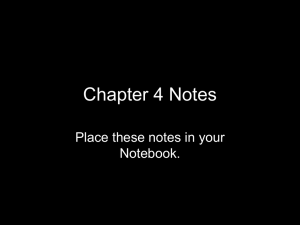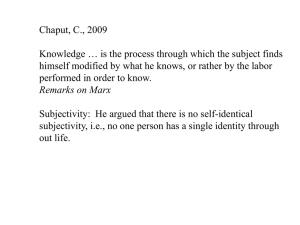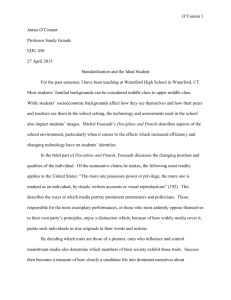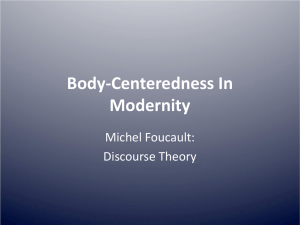PHIL 449 Syllabus, Spring 2014
advertisement
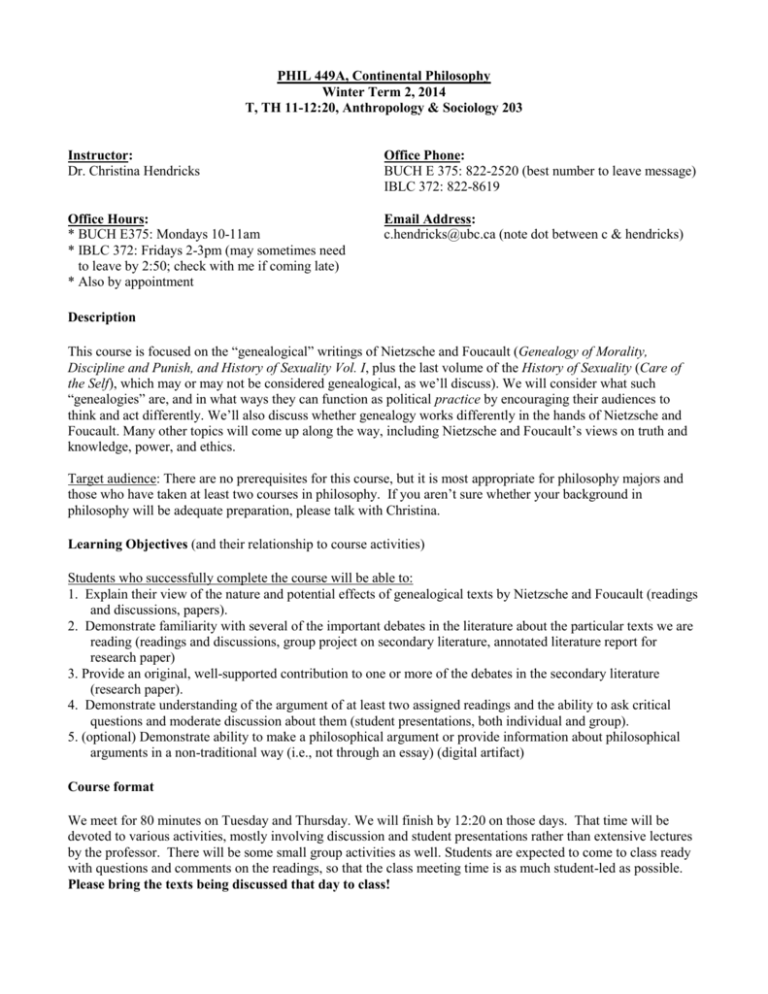
PHIL 449A, Continental Philosophy Winter Term 2, 2014 T, TH 11-12:20, Anthropology & Sociology 203 Instructor: Dr. Christina Hendricks Office Phone: BUCH E 375: 822-2520 (best number to leave message) IBLC 372: 822-8619 Office Hours: * BUCH E375: Mondays 10-11am * IBLC 372: Fridays 2-3pm (may sometimes need to leave by 2:50; check with me if coming late) * Also by appointment Email Address: c.hendricks@ubc.ca (note dot between c & hendricks) Description This course is focused on the “genealogical” writings of Nietzsche and Foucault (Genealogy of Morality, Discipline and Punish, and History of Sexuality Vol. I, plus the last volume of the History of Sexuality (Care of the Self), which may or may not be considered genealogical, as we’ll discuss). We will consider what such “genealogies” are, and in what ways they can function as political practice by encouraging their audiences to think and act differently. We’ll also discuss whether genealogy works differently in the hands of Nietzsche and Foucault. Many other topics will come up along the way, including Nietzsche and Foucault’s views on truth and knowledge, power, and ethics. Target audience: There are no prerequisites for this course, but it is most appropriate for philosophy majors and those who have taken at least two courses in philosophy. If you aren’t sure whether your background in philosophy will be adequate preparation, please talk with Christina. Learning Objectives (and their relationship to course activities) Students who successfully complete the course will be able to: 1. Explain their view of the nature and potential effects of genealogical texts by Nietzsche and Foucault (readings and discussions, papers). 2. Demonstrate familiarity with several of the important debates in the literature about the particular texts we are reading (readings and discussions, group project on secondary literature, annotated literature report for research paper) 3. Provide an original, well-supported contribution to one or more of the debates in the secondary literature (research paper). 4. Demonstrate understanding of the argument of at least two assigned readings and the ability to ask critical questions and moderate discussion about them (student presentations, both individual and group). 5. (optional) Demonstrate ability to make a philosophical argument or provide information about philosophical arguments in a non-traditional way (i.e., not through an essay) (digital artifact) Course format We meet for 80 minutes on Tuesday and Thursday. We will finish by 12:20 on those days. That time will be devoted to various activities, mostly involving discussion and student presentations rather than extensive lectures by the professor. There will be some small group activities as well. Students are expected to come to class ready with questions and comments on the readings, so that the class meeting time is as much student-led as possible. Please bring the texts being discussed that day to class! Required and Recommended Texts Required (if you have alternative editions of the following, that is fine) • Nietzsche, Friedrich. On the Genealogy of Morality. Trans. Maudemarie Clark and Alan J. Swensen. Indianapolis, Indiana: Hackett, 1998. • Owen, David. Nietzsche’s On the Genealogy of Morality. Montreal and Kingston: McGill-Queens University Press, 2007. • Foucault, Michel. Discipline and Punish: The Birth of the Prison. Trans. Alan Sheridan. New York: Vintage, 1995. • Foucault, Michel. The History of Sexuality Vol. I. Trans. Robert Hurley. New York: Vintage, 1990. • Foucault, Michel. The History of Sexuality Volume 3: The Care of the Self. Trans. Robert Hurley. New York: Vintage, 198. • Readings posted on the course website (which actually takes you to the Connect website for the course, for copyright reasons): http://blogs.ubc.ca/phil449/ Recommended • May, Todd. The Philosophy of Foucault. Montreal and Kingston: McGill-Queens University Press, 2006. • Optional readings posted on the course web site (see above) Course Website This course has several websites, actually, because no single one does everything I’d like. But I’ve linked them all together into our main course website, which is here: http://blogs.ubc.ca/phil449/ There is also a site on the Connect system, which I need because I’m posting some copyrighted material and that can’t be available on the open web; it can only be posted for students registered in the course. I’m also using the Connect site to allow you to submit assignments electronically and receive the marked versions back in a way that only you can see them. Your marks will also be posted on Connect. If you want to go straight to our Connect website, go to: http://connect.ubc.ca and log in with your CWL and password. Our course should show up for you if you are officially registered in it. If you’re not yet officially registered, talk with me and I’ll add you as a user. Evaluation – see below for details Attendance and Participation Blog posts & comments Critical abstracts for 2 secondary sources Individual presentation Research paper (14-16 pages) (due during April exam period)*+ Other (choose option (a) or (b))* (a) short paper on assigned readings (6-8 pages) (due Feb. 13)+ (b) non-conventional artifact (due March 6) 10% 5% 5% 10% 45% 25% * Completion of these items is required to pass this course + Graduate students who wish to receive graduate credit for the course will need to write longer papers. Please talk with Christina. Attendance and Participation: This is a seminar course, and as such, it relies heavily on the active participation of the members of the group in discussions. It also, therefore, requires that students actually attend class. (i). Attendance will be taken at each meeting (though the first one doesn’t count). You may have two unexcused absences without any harm to your participation mark, but after that your attendance/participation mark will begin to suffer: 5% off for each unexcused absence after two. What PHIL 449A, Fall 2009, p. 2 counts as “excused?” Just talk to me before you know you’re going to miss a class, and we’ll discuss it. Or, if you’re sick or there’s some emergency, that counts as excused of course. (ii). Peer review of papers: For the research papers, each student will do a peer review of at least one other student’s essay outline (likely more than one). Each student will need to submit an outline of their final paper to other students for peer review, and each will need to make comments on a draft of someone else’s paper and discuss these with the author. This forms part of your participation mark, and you must: (1) submit an outline of your research paper for peer review on the date noted on the schedule below, and (2) read and comment on the other person’s/people’s outlines assigned to you by the due date on the schedule below, (3) be in class on the day we are discussing the outlines orally in small groups. If you fail to do one of these by the due date, it will result in a 5% penalty off your participation mark; if you fail to any two or more, you will lose 10% off your participation mark. (iii). Participation in class discussions: I expect everyone to speak up during at least some class meetings (beyond your presentation, which is a separate part of your course mark). To receive an “A” for participation, you must not only fulfill (i) and (ii) above, you must also actively participate in class discussions, not at every meeting, but at most. For those who wish to think further before contributing to discussion, or for those who feel their in-class speaking doesn’t adequately reflect their level of engagement with class discussions, you may supplement your oral participation with extra blog posts (see below). If you fulfill (i) and (ii) above, you will have a B- (68) for participation as a baseline; your oral participation and extra blog posts (if applicable) will then be used to bring that up accordingly. Blog posts and comments: Everyone will need to do blog posts for the course. This can be either on a blog you already have, on a blog you create for the course, or on the course site itself (you can be an author on the site and just do your posts there without creating a new blog if you wish). Instructions on how to create a new blog or a category or tag for this course for an existing blog, will be posted on the course website (see above). You’ll need to do blog posts at least twice a month (no more than one a week), and comment on at least four posts by other students per month (no more than two in one week). Specific instructions for the blog posts and comments will be given in class and on the course website. Failure to complete the required number of posts per month will result in 5% off your attendance/participation mark for each month that happens, and the same for the required number of comments. Critical abstracts for secondary sources: These are short summaries of articles that also give an evaluation of the article. You’ll need to choose two secondary sources to do these for, and they will be posted online (without names attached) for other students to see, to help them with their literature searches for their own essays. You will need to complete these by March 20. Individual presentation: Each student will be required to give a presentation to the class once during the term (you’ll sign up for a date on which to do this). The idea is just to give a short summary of the main points of some assigned reading, provide questions for the class to discuss, and moderate class discussion on those questions. This is part of the ways we’ll try to ensure that most of our discussion comes from what students are interested in talking about. Research paper: You will be required to turn in a short summary of what you’re thinking of writing about, along with a preliminary list of literature, by March 13, and then a more specific summary with a draft thesis statement and outline (it may change later!) and annotated bibliography by April 1. The latter will be peer reviewed by other students. Then the final version will be due in the April exam period. Other: There are two options for this section of your course mark. Please choose one and let Christina know by the end of January. (a). short paper (6-8 pages) on Nietzsche, due Feb. 13 If you choose (a) you may rewrite the short paper (not the research paper). Please discuss this option with Christina, so we both have a sense of what needs the most work in the paper, and to arrange a due date. You must turn in the original paper with comments, along with the rewrite. The mark on the first version of the paper will count for 25% of the paper mark (including the late penalty, if PHIL 449A, Fall 2009, p. 3 applicable), and that of the second version will count for 75% (note that it is therefore possible to receive a lower grade on the rewrite—though unlikely!). This option may only be used if the paper to be rewritten had a passing grade to begin with (i.e., you may not use this option to make up for a paper you did not turn in, or on which you received a failing mark for what you did turn in). The second version must be turned in by the due date agreed to with the Instructor, or there will be a 5% per weekday penalty, just as for the first paper. If the rewrite is more than 5 weekdays late, it will not count at all and the mark on the first version will stand. (b). non-conventional artifact plus research paper: You will have the option to produce a non-conventional means of making a philosophical argument instead of the short paper, due March 6. The same thing as above applies to the digital artifact: you can redo it if you want (no rewrite option is available for the research paper). This could be a video, an image or series of images, an audio recording/podcast, or some webpage we use as part of the course website (I’ll give you access to edit the course website if you wish), or something else you can think of. More information will be given in class and on the course website. Marking will be less on the “artistic” aspects of the artifact than on how you are making some kind of argument with it, and what it expresses about the texts/discussions. Course and University Policies General information on assignments: Students should retain a copy of all submitted assignments and should also retain all their marked assignments in case they wish to apply for a Review of Assigned Standing (see http://www.calendar.ubc.ca/vancouver/index.cfm?tree=3,49,0,0#261). From the UBC calendar, http://www.students.ubc.ca/calendar/index.cfm?tree=3,41,93,0: Students have the right to view their marked (final) examinations with their instructor, providing they apply to do so by Jan 31 for Term 1 courses, by May 20 for Term 2 courses, and by Sept. 15 for summer courses. A final examination becomes the property of the University and must remain in the possession of the University for one year from the date of the examination, after which it should be destroyed or otherwise disposed of in accordance with UBC Policy 117. Policies on late or missed assignments * Individual and group presentations: A written summary (can be submitted electronically) is due by the beginning of class when you are to do your individual and group presentations. Failure to submit this on time will result in 5% off your presentation mark, for each presentation for which it happens. If you miss class on the day you are to give a presentation, either individually or in your small group, without an excused absence, you will lose 15% of your participation mark. If you cannot be in class that day, talk to Christina in advance to reschedule (rescheduling may or may not be possible, depending on the reason for your absence). If you miss class due to illness or an emergency, contact Christina as soon as you can to discuss rescheduling. * Blog posts and comments: As noted above, you must do a blog post every two weeks (two per month, but they can’t all be in the same week), and comment on others’ posts at least every two weeks (4 comments per month, but they can be no more than 2 per week). If you fail to do your posts on this schedule, you will lose 5% of you participation mark per month for each month you fail to do so. The same goes for the comments (so you could conceivably lose 10% of your participation mark per month for failing to do both on schedule!). At the end of each month you’ll need to send me a list of the URL’s for your posts and comments for the month. * Peer feedback on outlines of research papers: As noted above, you need to submit your outline, read and comment on an outline by one or more people, and attend class the day we are discussing comments in person. Failure to do any one of these by the due dates below will result in 5% off your attendance and participation mark, and failure to do any two or more by the due dates will result in 10% off your attendance and participation mark. * Essays and non-conventional artifacts are due by class time on the day noted on the schedule below (the due date for the final version of the research paper will be given in class). Papers may be submitted via the course Connect site or in hard copy. Late essays must be accompanied by a “late essay form,” available on the course web site. Late essays are subject to a 5% -per-weekday reduction in points (starting after the beginning of class time on the due date), unless due to an excused absence (may require documentation). If you know you PHIL 449A, Fall 2009, p. 4 are going to miss a due date, the sooner you talk to Christina the better, and definitely in advance of the due date. * Research paper stages: As noted above, you have deadlines for three stages: (1) a short summary of the general area of your research paper plus a preliminary list of literature; (2) a more in-depth summary with a draft statement of thesis and outline, plus an annotated list of literature; (3) the final essay. Failure to meet any of these deadlines will result in 5% per weekday off of the mark on your final version, for each deadline you fail to meet. So it’s important to get these in on time! Grading Standards Specific grading guidelines for essays will be provided later in the course and will be available on the course website: http://blogs.ubc.ca/phil449/ The following provide general guidelines that apply to all courses in the Faculty of Arts. (from: http://www.arts.ubc.ca/faculty-amp-staff/resources/courses-and-grading/grading-guidelines.html) 80% to 100% (A- to A+) Exceptional performance: strong evidence of original thinking; good organization; capacity to analyze and synthesize; superior grasp of subject matter with sound critical evaluations; evidence of extensive knowledge base. 68% to 79% (B- to B+) Competent performance: evidence of grasp of subject matter; some evidence of critical capacity and analytic ability; reasonable understanding of relevant issues; evidence of familiarity with the literature. 50% to 67% (D to C+) Adequate performance: understanding of the subject matter; ability to develop solutions to simple problems in the material; acceptable but uninspired work, not seriously faulty but lacking style and vigour. 00% to 49% (F) Inadequate performance: little or no evidence of understanding of the subject matter; weakness in critical and analytic stills; limited or irrelevant use of the literature. Scaling of Grades: “Marks in this course may be scaled (see Calendar, under Grading Practices). If scaling is required, it will be carried out after each assignment, so that students will know where they stand going into the final examination. If scaling is done on the final examination, students will be informed if they ask to review their examination according to the usual policy.” From the Calendar: “Faculties, departments and schools reserve the right to scale grades in order to maintain equity among sections and conformity to University, faculty, department, or school norms. Students should therefore note that an unofficial grade given by an instructor might be changed by the faculty, department or school. Grades are not official until they appear on a student's academic record.” (http://www.students.ubc.ca/calendar/index.cfm?tree=3,42,96,0). Class Etiquette Please make every effort to arrive on time, and do not leave class early without letting me know first that you must do so. Late arrivals and people getting up to leave (even to go to the washroom) are disruptive for everyone (if you MUST take a washroom break, do so as quietly as possible and don’t make it a habit to do so during class very often). Please don’t come to class if you are going to spend class time doing something else (e.g., surf the web, read material for other classes, etc.). I welcome people using computers and mobile devices in class for the purpose of taking notes and looking up things related to the class, but I will speak to you and ask you to stop using your device if you are using it for other things. Basic rules of respectful dialogue will be enforced, such as avoiding direct attacks on persons (you may criticize ideas/arguments, but avoid criticizing the person who gives those). Disrespectful speech such as name-calling, stereotyping, and derogatory remarks about ethnicity, religion, gender, sexual orientation and sexual/gender identity should be avoided, and may constitute harassing speech—see below. o Harassing speech will not be tolerated. The UBC Equity office defines harassment as follows (http://equity.ubc.ca/discrimination/#harassment): “Harassment, a form of discrimination, is a comment, conduct or behaviour that humiliates, intimidates, excludes and isolates an individual or group based on the BC Human Rights Code’s thirteen grounds of prohibited discrimination.” The thirteen grounds of prohibited discrimination are: age, ancestry, colour, family status, marital status, physical and mental disability, place of origin, political belief, race, religion, sex (including gender and pregnancy), sexual orientation, unrelated criminal conviction. PHIL 449A, Fall 2009, p. 5 o Please see http://equity.ubc.ca/discrimination/#harassment for examples of harassment, which include “Repeated derogatory comments or jokes based on one of the prohibited grounds,” and “Discussing the culture of other classmates, co-workers, or colleagues in a disrespectful or ridiculing manner.” Equity and special arrangements: I will work to ensure that all students have a fair and equitable opportunity for participation and success in the course. The University accommodates students with disabilities who have registered with the Disability Resource Centre. The University accommodates students whose religious obligations conflict with attendance, submitting assignments, or completing scheduled tests and examinations. See the university policy on religious holidays at: http://www.universitycounsel.ubc.ca/policies/policy65.pdf. Please let me know in advance, preferably in the first week of class, if you will require any accommodation on these grounds (you must notify your instructor at least two weeks in advance, according to the university policy cited above). Students who plan to be absent for varsity athletics, family obligations, or other similar commitments, cannot assume they will be accommodated, and should discuss their commitments with the instructor before the drop date. Academic Dishonesty: I take academic dishonesty very seriously, because ensuring that your grades reflect your own work is crucial to your own learning experience, to fairness to the rest of the students, and to those who expect your transcript to reflect your own efforts. Accordingly, I am vigilant about preventing, detecting, and deterring academic misconduct whenever possible, and to punishing cases of it to the fullest extent allowed by university policy. Please review the UBC Calendar Academic regulations for the university policy on cheating, plagiarism, and other forms of academic dishonesty (See the UBC Calendar, under “Academic Regulations,” and “Student Conduct and Discipline”: http://www.students.ubc.ca/calendar/index.cfm?tree=3,54,111,0). There are also links on the course website about what plagiarism is and how to avoid it. Schedule of readings and assignments – subject to change! See course website for changes Readings assigned for each day should be done before class on that day. Please bring the texts with you to class, as we will often be referring to them (and some class activities may require you to analyze parts of the text during class). Date Week 1 Jan. 9 Reading assignments Other assignments 1. Owen, Nietzsche’s Genealogy of Morality, Intro pp. 1-8; Chapters 2 & 3 (Chpt. 1 is optional), pp. 27-59 2. Nietzsche, Genealogy of Morality, Preface Week 2 Jan. 14, 16 1. Nietzsche, Genealogy of Morality, Preface & First Treatise 2. Owen, Nietzsche’s Genealogy of Morality, Chapters 4 & 5 3. Janaway, Christopher. “Good and Evil: Affect, Artistry and Revaluation.” Beyond Selflessness: Reading Nietzsche’s Genealogy. Oxford: Oxford UP, 2007. (course web site) Week 3 Jan. 21, 23 1. Nietzsche, Genealogy, Second Treatise 2. Owen, Nietzsche’s Genealogy of Morality Chapter 6 3. Strong, Tracy B. “Genealogy, the Will to Power, and the Problem of a Past.” In Nietzsche’s on the Genealogy of Morals: Critical Essays, ed. Christa Davis Acampora. Lanham, MD: Rowman and Littlefield, 2006. (course web site) * optional: Acampora, Christa Davis. “On Sovereignty and Overhumanity: Why it Matters How We Read Nietzsche’s Genealogy II:2.” In Nietzsche’s On the Genealogy of Morals: Critical Essays, ed. Christa Davis Acampora. Lanham, MD: Rowman and Littlefield, 2006. (course web site) PHIL 449A, Fall 2009, p. 6 1. Gemes, Ken (and Christopher Janaway). “Nietzsche on Free Will, Autonomy and the Sovereign Individual.” Proceedings of the Aristotelian Society (Supplement) 80:1 (June 2006): 321-338. (course web site) * optional: Janaway’s portion of the above article, pp. 339-357. (course web site) 2. Nietzsche, Genealogy Third Treatise 3. Owen, Nietzsche’s Genealogy of Morality Chapter 7 1. Gemes, Ken. “Nietzsche’s Critique of Truth.” Philosophy and Phenomenological Research 52:1 (March 1992): 47-65. (course web site) 2. Reginster, Bernard. “Perspectivism, Criticism and Freedom of Spirit.” European Journal of Philosophy 8:1 (2000): 40-62. (course web site) * optional: Ridley, Aaron. “The Scientist” Nietzsche’s Conscience: Six Character Studies from the ‘Genealogy.’ Ithaca and London: Cornell UP, 1998. (course web site) Submit URLs for January blog posts & comments by Fri. Jan. 31 Week 6 Feb. 11, 13 1. Foucault, “Nietzsche, Genealogy, History” (course web site) 2. Koopman, Colin. “What Problematization Is: Contingency, Complexity and Critique.” Genealogy as Critique: Foucault and the Problems of Modernity. Bloomington and Indianapolis: Indiana University Press, 2013. (course web site) 3. “What Our Present Is,” interview with Foucault by André Berten. Trans. Lysa Hochroth. In Foucault Live: Collected Interviews, 1961-1984, 2nd ed., ed. Sylvère Lotringer. New York: Semiotext(e), 1996. This interview was conducted in 1983, and first published in Cahiers du GRIFFE 37-38 (1988). (course web site) * optional: May, The Philosophy of Foucault Chapter 1 Short paper due Feb. 13 Feb. 17, 21 Week 7 Feb. 25, 27 Reading break 1. Foucault, Discipline and Punish Part One Chpt. 1 & 2, pp. 3-57 (rest of Chapter 2 is optional); Part Two Chpt. 2, pp. 104-131. 2. Second lecture (Jan 14, 1976) from Society Must be Defended: Lectures at the Collège de France 1975-1976 (course web site). An earlier translation, and truncated version of this lecture (along with the first lecture of this course in 1976) can be found under the title “Two Lectures,” in Power/Knowledge: Selected Interviews and Other Writings 1972-1977, ed. Colin Gordon. New York: Pantheon, 1980. * optional: May, The Philosophy of Foucault Chpt. 3, pp. 61-85 Submit URLs for February blog posts & comments by Fri. Feb. 28 Week 8 Mar. 4, 6 Foucault, Discipline and Punish, Part Three Chpts. 1, 2, & 3 pp. 135-228. * optional: Ransom, John. S. “Disciplines and the Individual.” Foucault’s Discipline: The Politics of Subjectivity. Durham and London: Duke University Press, 1997. (course web site) 1. Foucault, Discipline and Punish Part Four Chpts. 1 & 3 (Part Four Chpt. 2 is optional), pp. 231-256, 293-308. 2. Foucault, The History of Sexuality Vol. I, Parts 1 & 2, pp. 3-49 * optional: May, The Philosophy of Foucault Chpt. 3, pp. 85-95 Non-traditional artifact due March 6 1. Foucault, The History of Sexuality Vol. I, Parts 3-5 (pp. 53-159) 2. Foucault, “Power and Sex.” Interview with Bernard-Henri Lévy. Michel Foucault, Politics, Philosophy, Culture: Interviews and Other Writings, 1977-1984. Ed. Lawrence D. Kritzman. New York and London: Routledge, 1988. (course web site) Critical abstracts of two secondary sources due March 20 Week 4 Jan. 28, 30 Week 5 Feb. 4, 6 Week 9 Mar. 11, 13 Wk 10 Mar. 18, 20 PHIL 449A, Fall 2009, p. 7 Submit preliminary idea for area of research paper by March 13 Wk 11 Mar. 25, 27 1. Foucault, Introduction to History of Sexuality Vol. 2, The Use of Pleasure (course web site) 2. Arnold I. Davidson, “Ethics as Ascetics.” The Cambridge Companion to Foucault. 2nd ed. Ed. Gary Gutting. New York: Cambridge University Press, 2005. (course web site) 3. Foucault, The History of Sexuality Vol. 3, The Care of the Self, Part 1 Chapters 2 and 3, pp. 17-36; Part 2, pp. 39-68 * optional: May, The Philosophy of Foucault Chpt. 4 Submit URLs for March blog posts & comments by Fri. March 28 Wk 12 Apr. 1, 3 1. Foucault, The History of Sexuality Vol. 3, The Care of the Self, Part 4 Chapters 24, pp. 112-144; Part 5 Intro & Chapter 1 (189-210); Conclusion (235-240). 2. Foucault, “On the Genealogy of Ethics.” Michel Foucault: Beyond Structuralism and Hermeneutics. 2nd ed. Hubert L. Dreyfus and Paul Rabinow. Chicago: University of Chicago Press, 1983. Our version reprinted in Rabinow, Paul ed. The Foucault Reader. New York: Pantheon Books, 1984. (course web site) Wk 13 Apr. 8 (last day) Finish discussing Foucault on ethics; possibly one other reading if there’s time Submit draft thesis/outline/ annotated bibliography for research paper by April 1 Discuss comments on paper outlines, in class Research paper due during the April exam period (specific date TBA) PHIL 449A, Fall 2009, p. 8



